On Friday, the U.S. Supreme Court announced it would hear the case surrounding the Peace Cross in Bladensburg, Md. The 4th Circuit Court of Appeals ruled that the Bladensburg cross, a memorial to veterans who gave their last full measure of devotion in World War I, violated the Establishment Clause of the First Amendment. The Court’s decision to reconsider the case gives the cross a new lease on life.
“Our opponents want to erase the memory of these fallen servicemen from Prince George’s County,” Jeremy Dys, deputy general counsel at First Liberty Institute, told PJ Media. First Liberty and Jones Day are representing The American Legion in the case, which is known as The American Legion v. American Humanist Association.
Dys noted that the cross, erected in 1925, commemorates men who died in the Meuse-Argonne Offensive, the largest offensive in U.S. military history, which lasted from September 26 to November 11, 1918. The Court could not have chosen a better time to reconsider the case — 100 years after the battle in which these men died.
Last year, however, the 4th Circuit sided with the American Humanist Association, a secularist group that argued the memorial’s shape violated the First Amendment.
“The decision ignored the fact that the monument was modeled off of World War I grave markers, thousands of which are in the shape of a cross like this one,” Ken Klukowski, senior counsel at First Liberty Institute, told PJ Media last year.
Despite the historical meaning and resonance of the cross-shaped marker, which harkens back to World War I gravestones, the American Humanist Association argued that the Bladensburg cross violated the First Amendment’s Establishment Clause, which bars Congress from making any law “respecting an establishment of religion.”
“It’s a cross much more clearly and obviously than a memorial,” David Niose, a lawyer for the humanist association, told The Wall Street Journal.
Alvergia E. Guyton saw it differently. Her uncle, John Henry Seaburn, served as a private in the 372nd Infantry Regiment, 93rd Division, an all-African-American unit fighting with the French army. Her family told stories about the veteran, who left him at 16 in order to join the Army. He left to support his mother, Annie, and escape his father, John.
Guyton told The Washington Post that her family had a refrain: “John Seaburn is at the Peace Cross.”
The idea of knocking down or moving the memorial would be a personal affront to Guyton and her family. “I’m shocked they would even think about that,” she said. “It’s been there all my life. It’s history, and people can’t see it when they start tearing it down. You’re robbing the next generation.”
Seaburn is one of 49 American heroes commemorated on the cross. One Gold Star mother referred to the memorial as her son’s “grave stone.”
“There are some who want to erase the memory of the service and sacrfice of these 49 fallen servicemen of Prince George’s County,” Kelly Shackelford, president and CEO of First Liberty, said in a statement. “If this monument is bulldozed to the ground, it’s only a matter of time before the wrecking ball turns on Arlington National Cemetery and the thousands of memorials like this one across the country.”
When asked which monuments would be threatened by a win for the humanists, Jeremy Dys mentioned the Argonne Cross, the Canadian Cross of Sacrifice, and the Tomb of the Unknowns in Arlington National Cemetery. The Tomb of the Unknowns features religious language, Dys noted.
Even so, the fundamental insult would address the soldiers whose names are commemorated on the cross.
“The greatest national tragedy would be if this memorial is ruled unconstitutional and removed, because then we would we forget the men on this memorial and the sacrifice they made to preserve our freedom,” Dys told PJ Media.
“We forget what we do not see,” he argued. “The Gold Star mothers knew that, The American Legion that finally erected this monument knew that. They understood, and that’s why they erected this monument.”
“For nearly 100 years the memorial has stood to honor these 49 sons of Prince George’s County who made the ultimate sacrifice for their country,” Michael Carvin, lead counsel for The American Legion and partner at Jones Day and First Liberty, said in a statement. “The Supreme Court should not allow their memory to be bulldozed.”
Commemorating the heroes who gave their last full measure of devotion does not violate the First Amendment, even if the Bladensburg cross is in the shape of a cross. The Supreme Court will finally revisit the issue. The highest court in the land is not going to let the 4th Circuit’s ruling stand — at least not without a fight.
Follow the author of this article on Twitter at @Tyler2ONeil.









Join the conversation as a VIP Member